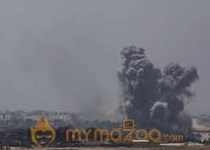Israeli Prime Minister Benjamin Netanyahu on Sunday vowed to do "whatever is necessary" in the country's latest weeks-long battle with Islamic militant group Hamas.
“Hamas has broken five cease-fires,” Netanyahu told "Fox News Sunday.” “They’ve violated their own cease-fires. They are firing on us now. … We’ll do whatever is necessary to achieve our goal of a sustained quiet.”
Hamas announced earlier Sunday that it has agreed to a 24-hour holiday truce in Gaza, hours after Israel resumed its ground offensive and airstrikes against the militant group for firing a salvo of rockets at the southern part of the country.
After Israel announced a 24-hour truce late Saturday, Palestinian militants fired rockets deep into Israel, prompting it to resume an offensive aimed at destroying rocket launchers and cross-border attack tunnels used by Hamas, the Islamic militant group ruling the coastal strip.
But hours after the renewal of hostilities, Hamas said it would be willing to abide by a new 24-hour humanitarian truce ahead of the Eid al-Fitr holiday marking the end of the Muslim fasting month of Ramadan. The three-day Eid al-Fitr holiday is expected to begin Monday or Tuesday, depending on the sighting of the new moon.
Hamas spokesman Sami Abu Zuhri said the truce would go into effect at 2 p.m. local time Sunday (7 a.m. ET). However, shortly after the truce was to have started, warning sirens wailed in southern Israel and the military said three rockets landed in the area, without causing casualties or damage.
Lt. Col. Peter Lerner, an Israeli Army spokesman, did not say if Israel would hold its fire during the time requested by Hamas, but said troops would continue demolishing militant tunnels — the central goal of the Israeli ground operation in Gaza.
Families in Gaza would ordinarily be busy now with preparations for the holiday, with children getting new clothes, shoes and haircuts, and families visiting each other.
In the outdoor market of the Jebaliya refugee camp, vendors set up stands with clothes and shoes, but said business was slow. Hamed Abul Atta, 22, a shoe salesman, said he hadn't made a single sale in the first three hours after opening.
Abul Atta said he had opened the shop Sunday to get away from the crowded apartment where he and his family were staying with relatives after fleeing an area of heavy fighting, the Shijaiyah district in Gaza City.
He said his family house in Shijaiyah was badly damaged and that a cousin and three other relatives were among dozens of people killed in heavy fighting there last week.
"We can't feel any joy right now," he said when asked if he would mark the holiday in some way.
Israel had offered a 24-hour truce late Saturday, but Hamas -- which has demanded the lifting of the Israeli and Egyptian blockade on Gaza as well as the release of Palestinian prisoners -- rejected it.
The 20-day war has killed more than 1,060 Palestinians, mainly civilians, according to Palestinian health officials. Israel has lost 43 soldiers, while two Israeli civilians and a Thai worker in Israel were killed by rocket and mortar attacks from Gaza.
The military had earlier said about a dozen rockets were fired toward Israel since midnight -- without causing casualties or damage -- and that as a result it would "resume its aerial, naval and ground activity in the Gaza Strip." The Israeli military released a video showing a rocket being fired from what it said was a Gaza school.
"The military is aiming its fire at terror sites, but if citizens are accidentally harmed Hamas is responsible for this since it once again violated an offer for a humanitarian lull that Israel accepted," Netanyahu's office said in a statement.
The 12-hour lull on Saturday -- agreed to by both sides following intense U.S. and U.N. mediation efforts -- saw Palestinians return to neighborhoods reduced to rubble and allowed medics to collect close to 150 bodies, Palestinian health official Ashraf al-Kidra said.
Shortly thereafter, clashes erupted between Israeli troops and Gaza militants and the sounds of explosions echoed across the coastal territory. The Islamic Jihad group said one of its field commanders was killed by tank fire near the southern Gaza town of Khan Younis.
The military says it is doing its utmost to prevent civilian casualties, including by sending evacuation warnings to residents in targeted areas, and blames Hamas for putting civilians in harm's way.
Hamas and other militants in Gaza have fired more than 2,400 rockets at Israel since hostilities began on July 8, many deep into the Israeli heartland and toward most of the country's major cities. Casualties in the Israeli side have stayed relatively low thanks to Israel's sophisticated Iron Dome missile defense system and because residents have been vigilant about seeking shelter quickly upon hearing the air raid sirens.
Hamas spokesman Sami Abu Zuhri said any truce must include a withdrawal of Israeli forces from Gaza, and that tens of thousands of displaced people must be allowed to return to their homes. Israel's current terms are "not acceptable," he said in a text message to journalists.
Israel's acceptance of the cease-fire extension was premised on its soldiers remaining in Gaza to destroy the more than 30 tunnels the military says it has already found in the densely populated coastal strip. Israel says the tunnels represent a strategic threat because they allow Hamas fighters to carry out attacks on Israeli territory.







